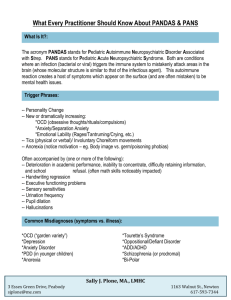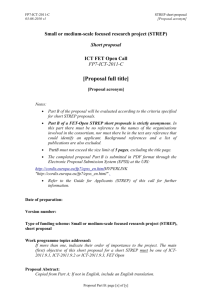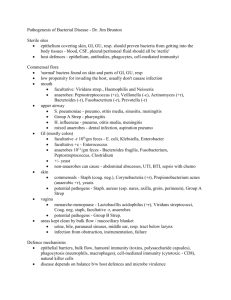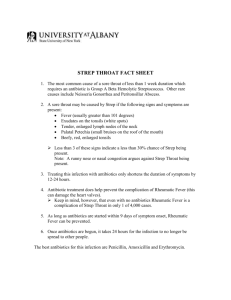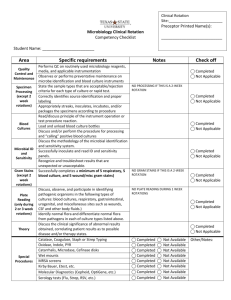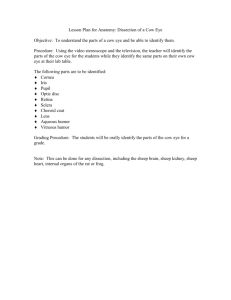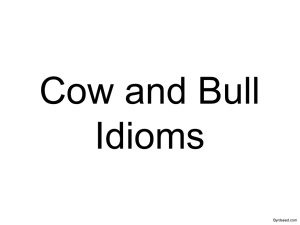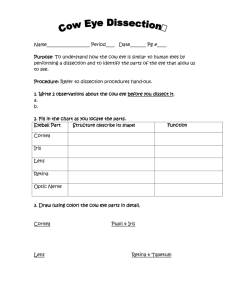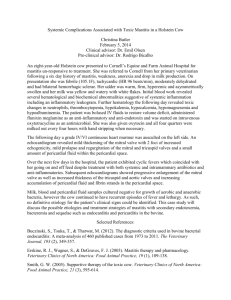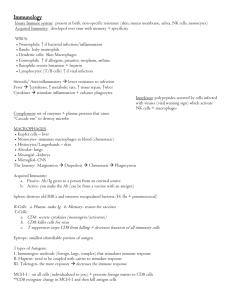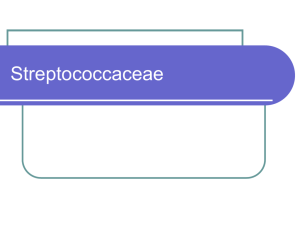The Mastitis Lab in Private Practice
advertisement
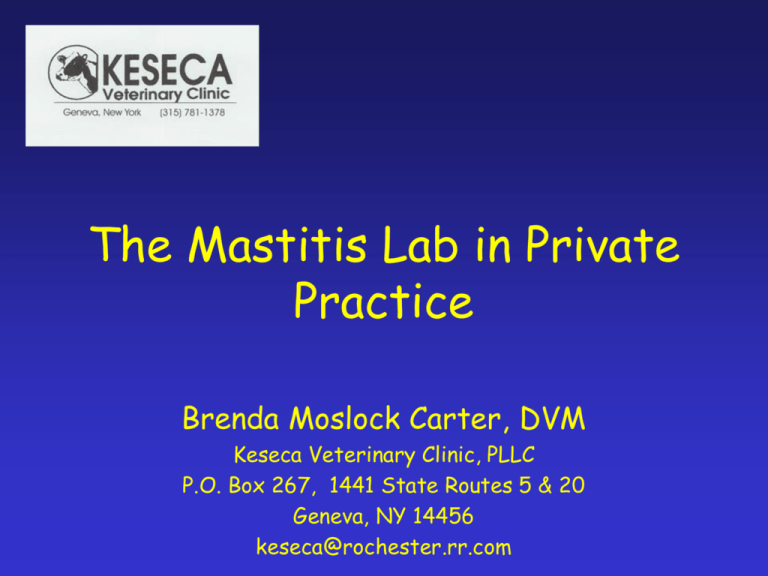
The Mastitis Lab in Private Practice Brenda Moslock Carter, DVM Keseca Veterinary Clinic, PLLC P.O. Box 267, 1441 State Routes 5 & 20 Geneva, NY 14456 keseca@rochester.rr.com Keseca’s in-house mastitis lab • Started in 2004 • Currently 2 technicians • Average ~450 cults/month (> 100/week) • Regularly participate in Lab Proficiency Program (QMPS) Laboratory Services • Individual cow cultures – Clinical & subclinical (High SCC) cows – Aerobic cultures +/- Mycoplasma (can refer out) • Bulk tank cultures – Regular monitoring (screening for contagious bugs) – Quantitative analysis (trouble-shooting high bacterial counts) Laboratory Services (contin’d) • Bedding cultures – Troubleshooting environmental mastitis • Towel cultures – Troubleshooting or routine monitoring • Colostrum & pasteurized waste milk – Monitoring hygiene +/- pasteurizer fnct – Troubleshooting calf health problems Quantitative analysis (“bacterial counts”) Keys to success with inhouse mastitis culturing • Rapid turnaround & reporting of results (next-day preliminaries) • Dedicated person in charge • Provide “value added service” (specific treatment recommendations, consultation/ follow-up, monthly summaries for large herds, etc.) Provide a value-added service Guidelines for Submission of Milk Samples to Keseca Veterinary Clinic’s Mastitis Lab & New Client Questionnaire 1. Call in for milk sample pick-up between 7:30am – 9:00am, Mon-Fri for same-day pickup. 315-781-1378. For next day results on samples collected after 9am, you must deliver them to the clinic by 3:30pm. 2. Preliminary results are reported 6 days/wk, Mon-Sat, (excluding holidays) on the day after the sample is received. Treatment recommendations will accompany the Prelims. Final results are read at 48hrs and only changes from prelims are reported directly. Final results will be uploaded to the LOOP and will appear in your cowfile when you download from DairyOne, however there may be a significant lag time before these appear. 3. We try to report your results in time to accommodate your treatment schedule, and can usually do this successfully during normal workdays, Mon-Fri. Saturday results are reported by the doctor on-call, and the time will vary. (rarely, not until Sunday) Primary contact :_________________________________ Phone______________ Secondary contact:__________________________ Phone__________________ Preferred method for receiving prelim results: Phone___________________ Fax____________________ Email___________________ CC_____________________ Do you want a hard copy of the final results (In addition to the automatic entry as a CULTURE event into DairyComp via downloads from the LOOP)? Yes / No If yes, how?____________________________________ What time do you treat the hospital cows? __________________ Will this be a DropBox herd? Yes / No Herds are also given a sheet of personalized labels to put on sample vials Individual cow samples Composite samples Only exceptions 1. Screening for mycoplasma or prototheca 2. Post-tx sample of Staph aureus cow Only exceptions: screening for Myco or Prototheca -or- post-treatment Staph aureus screening So what do we need to start up a mastitis lab in our clinic? Necessary Equipment • Incubator @ 37o C • • • • • +/- another @ 32o C for bulk tank cultures Bunsen burner or little propane torch Refrigerator for storing plates Freezer for storing samples Microscope Fluorescent & incandescent light sources Incubator • 37o (+/- 32o) • Desktop model – Holds up to ~50 plates + tube rack – Used models < $100 • Check local dealers for used hospital equipment • Desktop incubator @ 37o C (~ $100 used) • Little propane torch ($45) Refrigerator/freezer Microscope • Fluorescent & incandescent light sources ($15 each) Total capital investment < $200 (Assuming clinic already has a fridge/freezer and microscope) Necessary Supplies • • • • • Sterile cotton swabs (or disposable loops) Wire loops (10uL) Disposable sterile plastic 1ml pipettes Microscope slides +/- Graduated pipettes (if doing bacterial counts) • Tube rack Basic Media & Reagents for NMC Method • • • • • • • Blood agar plates MacConkey plates Coagulase tubes Broth tubes Gram staining kit Hydrogen Peroxide Potassium Hydroxide Misc. • System for tracking samples, recording & reporting results • NMC Handbook, other reference manuals • Good relationship with your local referral lab – Training – Phone support – Diagnostic support Culture ® Tracker software • Developed by Dairy One in NY • Generates worksheet for lab techs • Final result sheet for client also shows cow’s prior culture history • Data can be exported to Excel for analysis Results come with the cow’s history of previous cultures • Easy to identify chronic cows • If repeat quarter: is it the same bacteria (treatment failure) or a new infection? • Follow-up on Staph aureus cows Previous culture results Current culture result Culture ® Tracker software • Results interface with Dairy Comp via Dairy One (uploaded to the LOOP) • Farm’s computer can be set to automatically download new results daily • Results automatically recorded in Dairy Comp or Scout Results recorded in a consistent manner Initial cost ~$250 Annual fee ~$275 Diagnostic Flowchart “Strep species ” (i.e. “Strep non-ag”) • Strep dysgalactia (Strep dys) • Strep uberis • Lactococcus sp. – Lactococcus lactis • Aerococcus sp. • Enterococcus sp. May explain differences in response to treatment of “Strep species” Strep Diagnosed - KOH neg, Catalase neg, Gram pos cocci Differentiating Strep species Hemolysis? Wide Narrow Strep canis - confirm with CAMP test Grp G Antibody None Strep ag - confirm with CAMP test Grp B Antibody Negative Or Dubious Esculin Splitting? Positive Growth on Enterococcosel media? Strep dys - confirm with Grp C Antibody (“PathoDx C”) Yes No Strep uberis “Strep other” - Enterococcus - Lactococcus - Aerococcus Takes an additional day “Esculin-Splitting” black light-vs-fluorescent light views (same 2 plates) black light Only 1 isolate is positive for “esculin-splitting” (gray/black-tint) standard lighting 3 out of 4 isolates “esculin-positive” (greenish-tint) Mycoplasma Culturing • Requires special media & incubation conditions (CO2 incubator) • Can be tricky to read (up to 7 days) • Whether or not you offer may depend upon prevalence in your area Alternative approach to Mycoplasma surveillance = referring out for pooled cultures Pooling for Mycoplasma Surveillance Pros • Referral lab better equipped to handle, esp if in low-prevalence area • Cost-effective way to increase myco surveillance • May find it before it shows up in Bulk Tank cultures Cons • Myco susceptible to repeated freeze-thaw cycles & prolonged storage – May get more false-negs in low-cfu samples • Delayed turnaround if pool is pos – Need to wait for individual samples to be run • May not be available in all areas Of the cases we culture in our practice: • ~1/3 are considered treatable Overall, we recommend treatment for • ~1/3 onlyare ~50%sometimes of the clinical cases we culture treatable Coliforms – (based on cow’s history & severity / amount of bacteria) • ~1/3 should not be treated – (sometimes because the bacteria are already gone!) Staph aureus Staph species Streps Staph species Yeast Prototheca Mycoplasma No Growth Treatment Recommendations Intramammary Antibiotics: to Treat or not to Treat? Generally Treat Sometimes Treat Never Treat Strep ag Staph aureus* A pyo (Extended therapy) Strep dysgalactia Staph species (CNS Yeast Staph) Strep uberis* Coliforms Mycoplasma (Extended therapy) Influencing factors: - Chronicity (based upon SCC hx) - #cfu Prototheca “No growth” or “NSO” The cost of over-treating: an extreme example this herd not only treated every clinical case, but they kept cows in treated group until CMT improved 2006 2005 2004 2003 2002 2001 6.0 4.0 2.0 0.0 2000 Avg Lbs/cow/day dumped Avg Lbs/cow/day dumped The dairy SOLD more milk/cow in 2006 despite producing ~2lbs less per cow than in 2005 Cost of dumped milk $ 140, 000. 00 $ 120, 000. 00 $ 100, 000. 00 $ 80, 000. 00 $ 60, 000. 00 $ 40, 000. 00 $ 20, 000. 00 $2000 2001 2002 2003 V al ue of dumped mi l k @$ 12. 50/ cwt 2004 2005 2006 A ct ual val ue of dumped mi l k based on mai l box pr i ce
